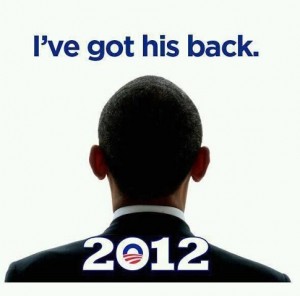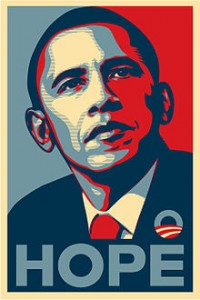by Raffi Sarkissian
One of the more striking campaign slogans I came across during the 2012 Presidential election was a picture of Obama’s back from the shoulders up with the accompanying text, “I’ve Got His Back.” It wasn’t until after the election that I realized this was not part of any official Obama or DNC campaign, but an independent group campaigning for Obama. In fact, it is hard to pinpoint the original source of the image and/or slogan as some brief search indicates that it has been picked up and used by various organizations, campaigns, and calls to action in favor of re-electing Obama. What caught my interest from the perspective of civic participation was not the use and spread of the image, but its insinuations about Obama supporters’ relationship with the President and the awkwardly skeptical call to action it invokes in voters.
The simple message communicates so much and could surely be interpreted in many different ways. Chief among the basic insinuations is the idea that Obama needs your help to get re-elected. This is not something new to Obama’s campaign rhetoric as his platform, dating back to his first Presidential run, was built on grassroots support and power (or arguably a mandate in 2008) by the masses. Yet, I see this particular slogan as carrying an additional glass-half-empty layer that implies (perhaps accurately) that his political standing with the American people, and more so among his original supporters, is weak. It gives up on attempting to tap into the feeling of invincibility that followed election night in 2008 and instead suggests that he doesn’t carry the same amount of support as he did before. Maybe this is strategically smart if giving the impression of being invulnerable would discourage people from voting. But it remains that this is a drastically different message that is supposed to be coming from the public, and is accentuated when compared with last election’s iconic campaign graphic:
In 2008, people were looking squarely at the face of hope. With the image this time around, we are looking at the President’s back (further emphasized with merchandise that shows his back from the waist up as in the t-shirt seen here). While I realize much of the elaboration of the slogan revolves around a “we’ve got his back because he’s got ours” approach, I can’t help but feel that seeing Obama turned from facing the viewer (the supporter) may also induce feelings of “he’s turned his back on us,” which feeds into the disappointment and resentment a wide range of supporters have expressed since 2008. Additionally, the association of “I’ve got his back” with “street” vernacular encapsulates potentially violent implications beyond ideological support. While I don’t mean to insinuate that the poster will cause physical altercations between Republicans and Democrats, it does egg on the existing violence that continues to polarize the American people on the political spectrum. As this is an admittedly pessimistic take on this bit of campaign iconography, I am curious to hear others’ interpretations and welcome comments to broaden the understanding of the civic mentality behind “I’ve got his back.”



